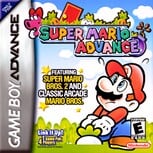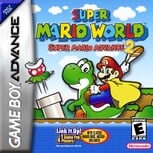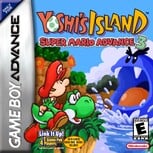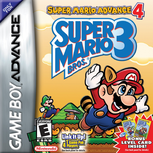Super Mario Advance (series): Difference between revisions
No edit summary |
|||
| (134 intermediate revisions by 58 users not shown) | |||
| Line 1: | Line 1: | ||
{{series | {{italic title}} | ||
|image=[[File:SMAlogo.png| | {{series infobox | ||
|first=''[[ | |image=[[File:SMAlogo.png|270px]] | ||
|latest=''[[ | |first=''[[Super Mario Advance]]'' ([[List of games by date#2001|2001]]) | ||
|latest=''[[Super Mario Advance 4: Super Mario Bros. 3]]'' ([[List of games by date#2003|2003]]) | |||
|number=4 | |number=4 | ||
| | |parent=[[Super Mario (series)|''Super Mario'']] | ||
|franchise=[[Super Mario (franchise)|''Super Mario'']], [[Yoshi (franchise)|''Yoshi'']] | |||
}} | }} | ||
The '''''Super Mario Advance''''' series is a series of video game | The '''''Super Mario Advance''''' series is a [[Super Mario (series)|''Super Mario'']] subseries that consists of video game [[reissue]]s released only on the [[Game Boy Advance]]. It is a successor to ''[[Super Mario Bros. Deluxe]]'' on the [[Game Boy Color]],<ref>{{cite|deadlink=y|archive=web.archive.org/web/20021208222825/http://www.nintendo.co.jp/nom/0103/031/index.html|title=3.開発者インタビュー『スーパーマリオアドバンス』|publisher=Nintendo|language=ja|accessdate=June 28, 2024}}</ref><ref>{{cite|author=Marionova64|date=July 30, 2020|url=x.com/Marionova64/status/1288818364132057093|title=''Super Mario Advance'' Unused Title Screen Voicelines|publisher=Twitter|language=en|accessdate=August 6, 2020}}</ref> itself an indirect successor to ''[[Donkey Kong (Game Boy)|Donkey Kong]]'' on the [[Game Boy]], and a predecessor to ''[[Super Mario 64 DS]]'' on the [[Nintendo DS]]. Each game contains a classic sidescroller of the [[Super Mario (franchise)|''Super Mario'' franchise]] or [[Yoshi (franchise)|''Yoshi'' franchise]], with improved graphics, improved sound, and additional features. Also, each game contains an [[Mario Bros. (Game Boy Advance)|updated version]] of the 1983 arcade game ''[[Mario Bros. (game)|Mario Bros.]]'' with multiplayer access. The series finished in 2003 with four games, although ''[[New Super Mario Bros.]]'', the first original 2D platformer of the ''Super Mario'' franchise since 1992's ''[[Super Mario Land 2: 6 Golden Coins]]'', was developed as a response to requests for a fifth ''Super Mario Advance'' entry.<ref>{{cite|deadlink=y|archive=web.archive.org/web/20101207010424/http://us.wii.com/iwata_asks/mario25th/vol3_page4.jsp|title=Iwata Asks: Super Mario Bros. 25th Anniversary|publisher=Nintendo of America|language=en-us|accessdate=June 28, 2024}}</ref> | ||
{{br|toc=1}} | |||
==Games== | |||
{|class="wikitable"width="100%" | |||
!width=15% style="background-color: #d9d9d9;font-size:125%;text-align:left"colspan="2"|Title | |||
|- | |||
!width=15% style="background-color: #e0e0e0;"|Cover and release date | |||
!width=85% style="background-color: #e0e0e0;"|Synopsis | |||
|- | |||
!colspan="2"style="font-size:125%;text-align:left"|''[[Super Mario Advance]]'' | |||
|- | |||
|align="center"|[[File:SMA.jpg|153px]]<span style="font-size:8pt"><br>{{flag list|Japan|March 21, 2001<ref>{{cite|url=www.nintendo.co.jp/n08/amaj/index.html|title=スーパーマリオアドバンス|publisher=Nintendo|language=ja|accessdate=June 28, 2024}}</ref>}}</span> | |||
|'''''Super Mario Advance''''' is the first entry of the series, released as a launch title for the Game Boy Advance. It features ''[[Super Mario Bros. 2]]'', based heavily on the ''[[Super Mario All-Stars]]'' remaster of the game. The game includes many new additional features, including an all-new point-scoring system; "giant" variants of [[vegetable]]s, enemies, and [[POW Block]]s; the new enemy [[Robirdo]], as the new boss of World 3; and the "Yoshi Challenge," a new mode in which players can revisit stages to search for [[Yoshi's Egg|Yoshi Eggs]]. | |||
== | The game was later re-released for the [[Wii U]] through [[Virtual Console]] initially in 2014, and it was added to [[Game Boy Advance - Nintendo Switch Online]] in 2023. | ||
|-style=font-size:8pt align=center| | |||
|- | |||
!colspan="2"style="font-size:125%;text-align:left"|''[[Super Mario World: Super Mario Advance 2]]'' | |||
|- | |||
|align="center"|[[File:Box Art NA - Super Mario World Super Mario Advance 2.jpg|153px]]<span style="font-size:8pt"><br>{{flag list|Japan|December 14, 2001<ref>{{cite|url=www.nintendo.co.jp/n08/aa2j/index.html|title=スーパーマリオアドバンス2|publisher=Nintendo|language=ja|accessdate=June 28, 2024}}</ref>}}</span> | |||
|'''''Super Mario World: Super Mario Advance 2''''' is the second entry in the series. It features ''[[Super Mario World]]'', as it has numerous gameplay, visual, sound, and [[level]] design changes from the original, with the most noticeable alteration being that the game is playable for only one player, as with the addition of [[Luigi]] reworked to be played in single-player mode as an optional character. | |||
The game was later re-released for the Wii U through Virtual Console initially in 2014, and it was added to Game Boy Advance - Nintendo Switch Online in 2023. | |||
|-style=font-size:8pt align=center | |||
|- style= | |||
|- | |- | ||
! | !colspan="2"style="font-size:125%;text-align:left"|''[[Yoshi's Island: Super Mario Advance 3]]'' | ||
|''[[ | |||
|- | |- | ||
|align="center"|[[File:Super Mario Advance 3 Box Art.jpg|153px]]<span style="font-size:8pt"><br>{{flag list|USA|September 1, 2002<ref>''Super Smash Bros. Brawl'' {{iw|smashwiki|Chronicle}}</ref>}}</span> | |||
|'''''Yoshi's Island: Super Mario Advance 3''''' is the third entry in the series. It features ''[[Super Mario World 2: Yoshi's Island]]'', with a number of differences from the original surrounding gameplay, graphics, sound, and level design. It also includes some new additional content, featuring six all-new levels. | |||
- | The game was later re-released for the [[Nintendo 3DS]] and Wii U through Virtual Console, with the former release exclusive to the Nintendo 3DS Ambassador Program. It was also added to Game Boy Advance - Nintendo Switch Online in 2023. | ||
{{ | |-style=font-size:8pt align=center | ||
| | |||
|- style=font-size:8pt align=center | |||
|- | |- | ||
! | !colspan="2"style="font-size:125%;text-align:left"|''[[Super Mario Advance 4: Super Mario Bros. 3]]'' | ||
- | |||
|''[[ | |||
|- | |- | ||
|align="center"|[[File:Super Mario Advance 4 Box.png|153px]]<span style="font-size:8pt"><br>{{flag list|Japan|July 11, 2003<ref>{{cite|url=www.nintendo.co.jp/n08/ax4j/index.html|title=スーパーマリオアドバンス4|publisher=Nintendo|language=ja|accessdate=June 28, 2024}}</ref>}}</span> | |||
|'''''Super Mario Advance 4: Super Mario Bros. 3''''' is the fourth and final entry in the series. It features ''[[Super Mario Bros. 3]]'', as a heavily updated version of it with graphics and sound similar to the ''Super Mario All-Stars'' version. Apart from some gameplay, graphics, sound, and level design changes, the game has many new additional features and content, with the most significant feature being that the game has compatibility with the [[e-Reader]] and [[Super Mario Advance 4: Super Mario Bros. 3 e-Reader cards|its cards]]. These cards can be scanned into the game and unlock items, demos, and new levels to which they can be played in the new [[World-e]]. | |||
- | The game was later re-released for the Wii U through Virtual Console, and it was re-released as one of the launch titles for Game Boy Advance - Nintendo Switch Online in 2023. | ||
{{ | |||
| | |||
|} | |} | ||
==Changes from the original games== | |||
*In every game in the series, there are added voice clips for each player character and, in some cases, bosses. | |||
*In line with the current standard, ''Super Mario Advance'', ''Super Mario World: Super Mario Advance 2'', and ''Super Mario Advance 4: Super Mario Bros. 3'' also refer to [[Princess Peach|Princess Toadstool]] as "Peach" (as introduced to {{wp|Western world|the West}} in ''[[Yoshi's Safari]]'' and retained in ''[[Super Mario 64]]'' onward). | |||
*In ''Super Mario World: Super Mario Advance 2'', Luigi is playable in single-player mode as an optional character, and he has his special attributes from ''Super Mario Bros. 2'', with a higher [[jump]] and lower traction. | |||
*In ''Super Mario Advance 4: Super Mario Bros. 3'', some levels have been slightly altered to fit on the GBA screen. | |||
==Gallery== | ==Gallery== | ||
<gallery> | <gallery> | ||
Super Mario Advance logo.png|American logo of ''[[Super Mario Advance]]'' | |||
LogoChinese SMAdvance.png|Chinese logo of ''Super Mario Advance'' | |||
SMA Japanese Box Art.png|The Japanese game cover for ''Super Mario Advance'' | |||
Yoshis island logo.png|American logo of ''[[Yoshi's Island: Super Mario Advance 3]]'' | |||
LogoChinese YI-GBA.png|Chinese logo of ''Yoshi's Island: Super Mario Advance 3'' | |||
SuperMarioAdvance4JPBoxArt.jpg|Japanese box art of ''[[Super Mario Advance 4: Super Mario Bros. 3]]'' | |||
</gallery> | </gallery> | ||
==Names in other languages== | |||
{{foreign names | |||
|Jpn=スーパーマリオアドバンス<ref>{{cite|url=topics.nintendo.co.jp/article/a866e60e-7b71-4d82-9136-589808a3d386|title=ゲームボーイアドバンス Nintendo Switch Online「スーパーマリオアドバンス」シリーズの3作が5月26日に追加。|publisher=Nintendo|language=ja|accessdate=May 18, 2023}}</ref> | |||
|JpnR=Sūpā Mario Adobansu | |||
|JpnM=Super Mario Advance | |||
}} | |||
==References== | ==References== | ||
<references/> | <references/> | ||
{{ | {{Game series}} | ||
[[Category:Game | {{Super Mario games}} | ||
[[Category:Platforming | [[Category:Game series]] | ||
[[Category:Platforming games]] | |||
Latest revision as of 20:12, January 18, 2025
| Super Mario Advance | |
|---|---|
| First installment | Super Mario Advance (2001) |
| Latest installment | Super Mario Advance 4: Super Mario Bros. 3 (2003) |
| Number of installments | 4 |
| Parent series | Super Mario |
| Franchise | Super Mario, Yoshi |
The Super Mario Advance series is a Super Mario subseries that consists of video game reissues released only on the Game Boy Advance. It is a successor to Super Mario Bros. Deluxe on the Game Boy Color,[1][2] itself an indirect successor to Donkey Kong on the Game Boy, and a predecessor to Super Mario 64 DS on the Nintendo DS. Each game contains a classic sidescroller of the Super Mario franchise or Yoshi franchise, with improved graphics, improved sound, and additional features. Also, each game contains an updated version of the 1983 arcade game Mario Bros. with multiplayer access. The series finished in 2003 with four games, although New Super Mario Bros., the first original 2D platformer of the Super Mario franchise since 1992's Super Mario Land 2: 6 Golden Coins, was developed as a response to requests for a fifth Super Mario Advance entry.[3]
Games[edit]
| Title | |
|---|---|
| Cover and release date | Synopsis |
| Super Mario Advance | |
 |
Super Mario Advance is the first entry of the series, released as a launch title for the Game Boy Advance. It features Super Mario Bros. 2, based heavily on the Super Mario All-Stars remaster of the game. The game includes many new additional features, including an all-new point-scoring system; "giant" variants of vegetables, enemies, and POW Blocks; the new enemy Robirdo, as the new boss of World 3; and the "Yoshi Challenge," a new mode in which players can revisit stages to search for Yoshi Eggs.
The game was later re-released for the Wii U through Virtual Console initially in 2014, and it was added to Game Boy Advance - Nintendo Switch Online in 2023. |
| Super Mario World: Super Mario Advance 2 | |
 |
Super Mario World: Super Mario Advance 2 is the second entry in the series. It features Super Mario World, as it has numerous gameplay, visual, sound, and level design changes from the original, with the most noticeable alteration being that the game is playable for only one player, as with the addition of Luigi reworked to be played in single-player mode as an optional character.
The game was later re-released for the Wii U through Virtual Console initially in 2014, and it was added to Game Boy Advance - Nintendo Switch Online in 2023. |
| Yoshi's Island: Super Mario Advance 3 | |
 |
Yoshi's Island: Super Mario Advance 3 is the third entry in the series. It features Super Mario World 2: Yoshi's Island, with a number of differences from the original surrounding gameplay, graphics, sound, and level design. It also includes some new additional content, featuring six all-new levels.
The game was later re-released for the Nintendo 3DS and Wii U through Virtual Console, with the former release exclusive to the Nintendo 3DS Ambassador Program. It was also added to Game Boy Advance - Nintendo Switch Online in 2023. |
| Super Mario Advance 4: Super Mario Bros. 3 | |
 |
Super Mario Advance 4: Super Mario Bros. 3 is the fourth and final entry in the series. It features Super Mario Bros. 3, as a heavily updated version of it with graphics and sound similar to the Super Mario All-Stars version. Apart from some gameplay, graphics, sound, and level design changes, the game has many new additional features and content, with the most significant feature being that the game has compatibility with the e-Reader and its cards. These cards can be scanned into the game and unlock items, demos, and new levels to which they can be played in the new World-e.
The game was later re-released for the Wii U through Virtual Console, and it was re-released as one of the launch titles for Game Boy Advance - Nintendo Switch Online in 2023. |
Changes from the original games[edit]
- In every game in the series, there are added voice clips for each player character and, in some cases, bosses.
- In line with the current standard, Super Mario Advance, Super Mario World: Super Mario Advance 2, and Super Mario Advance 4: Super Mario Bros. 3 also refer to Princess Toadstool as "Peach" (as introduced to the West in Yoshi's Safari and retained in Super Mario 64 onward).
- In Super Mario World: Super Mario Advance 2, Luigi is playable in single-player mode as an optional character, and he has his special attributes from Super Mario Bros. 2, with a higher jump and lower traction.
- In Super Mario Advance 4: Super Mario Bros. 3, some levels have been slightly altered to fit on the GBA screen.
Gallery[edit]
American logo of Super Mario Advance
American logo of Yoshi's Island: Super Mario Advance 3
Japanese box art of Super Mario Advance 4: Super Mario Bros. 3
Names in other languages[edit]
| Language | Name | Meaning | Notes |
|---|---|---|---|
| Japanese | スーパーマリオアドバンス[8] Sūpā Mario Adobansu |
Super Mario Advance |
References[edit]
- ^ 3.開発者インタビュー『スーパーマリオアドバンス』. Nintendo (Japanese). Archived December 8, 2002, 22:28:25 UTC from the original via Wayback Machine. Retrieved June 28, 2024.
- ^ Marionova64 (July 30, 2020). Super Mario Advance Unused Title Screen Voicelines. Twitter (English). Retrieved August 6, 2020.
- ^ Iwata Asks: Super Mario Bros. 25th Anniversary. Nintendo of America (American English). Archived December 7, 2010, 01:04:24 UTC from the original via Wayback Machine. Retrieved June 28, 2024.
- ^ スーパーマリオアドバンス. Nintendo (Japanese). Retrieved June 28, 2024.
- ^ スーパーマリオアドバンス2. Nintendo (Japanese). Retrieved June 28, 2024.
- ^ Super Smash Bros. Brawl Chronicle
- ^ スーパーマリオアドバンス4. Nintendo (Japanese). Retrieved June 28, 2024.
- ^ ゲームボーイアドバンス Nintendo Switch Online「スーパーマリオアドバンス」シリーズの3作が5月26日に追加。. Nintendo (Japanese). Retrieved May 18, 2023.





